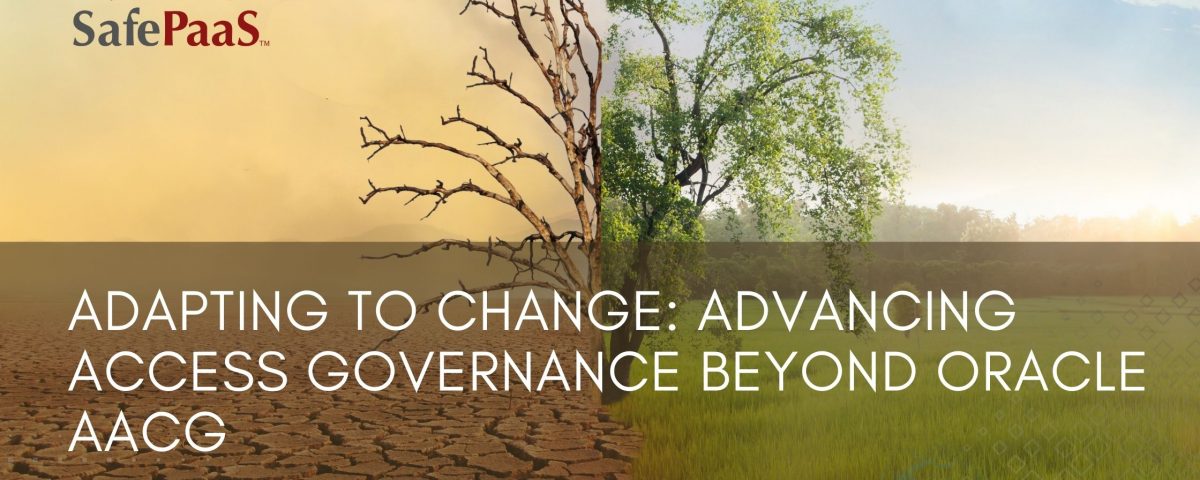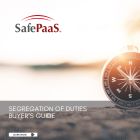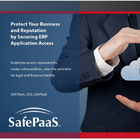Advancing Access Governance Beyond Oracle AACG


Adapting to Change: Advancing Access
Governance Beyond Oracle AACG
In 2016, Oracle announced it would no longer support its Governance, Risk, and Compliance (GRC) applications, including the Application Access Controls Governor (AACG). The AACG solution helps prevent unauthorized user access, manages Segregation of Duties (SoD), and detects potential threats. As a result, Oracle GRC users have been moved to Oracle's "Sustaining Support" until May 2025.
Sustaining Support means that Oracle will continue to support the functionalities available in either premier or extended support. However, there will be no new program updates, fixes, security alerts, and critical patch updates. This shift can be especially impactful for companies, particularly publicly traded ones. It is recommended that your Audit Committee and internal/external auditors be notified of the discontinuation of GRC support, which may impact your financial and SOX audits.
The Legacy of Oracle GRC
The discontinuation of AACG highlights the limitations of legacy systems and increases cybersecurity risks for organizations. With the obsolescence of support for AACG, organizations relying on this solution are exposed to potential security breaches and compliance violations. Cyber attackers often target outdated software and systems, exploiting known vulnerabilities to gain unauthorized access to sensitive data and systems.
Moreover, AACG's inability to adapt to modern IT landscapes leaves organizations vulnerable to gaps in access governance, creating opportunities for insider threats and unauthorized access. As organizations struggle to maintain compliance and manage access controls without adequate support from legacy GRC solutions, the risk of data breaches and regulatory penalties rises, posing significant challenges to cybersecurity efforts. Therefore, the dependence on outdated and inflexible GRC solutions like AACG contributes to the growing cybersecurity threat, underscoring the urgent need for to adopt more robust and adaptable security measures.
For instance, organizations using Oracle AACG often struggle with disconnected systems, manual processes, and limited scalability. These challenges hinder their ability to efficiently manage access controls, leading to compliance gaps and increased exposure to security risks. Moreover, the lack of real-time visibility into access entitlements and user activities makes it difficult for organizations to respond promptly to emerging threats and compliance requirements.
New Threats, New Challenges
Organizations face various new threats in today's digital age, from sophisticated cyberattacks to insider risks. The proliferation of cloud services, mobile devices, and remote work has further complicated access management, making maintaining visibility and control over sensitive data and critical systems challenging. Legacy solutions like Oracle AACG are ill-equipped to address these evolving challenges, leaving organizations vulnerable to security breaches and compliance gaps.
Oracle customers transitioning to cloud-based solutions face significant challenges with legacy access governance tools like Oracle AACG. Secure and compliant access becomes crucial as multinational corporations expand into new markets and embrace remote work. However, AACG lacks compatibility with critical platforms such as Oracle ERP Cloud and struggles to integrate with complex access management systems.
Organizations adopting cloud may face increased security breaches and compliance violations without robust access governance solutions that can adapt to the cloud. To address these challenges, Oracle customers should explore alternative access governance solutions that offer greater flexibility and adaptability.
Embracing Modern Access Governance Solutions
Enter modern access governance platforms designed to meet the needs of today's dynamic business environment. These platforms offer a unified approach to access governance, providing continuous monitoring, adaptive access controls, self-service capabilities, and scalability. By leveraging advanced technologies such as self-service controls monitoring and preventive controls embedded within the business process, modern access governance solutions can empower your organization to proactively identify and mitigate risks, streamline compliance processes, and enhance user experiences.
For example, consider a financial services firm leveraging a modern access governance platform to streamline its access review process. The platform should automatically identify access outliers and high-risk entitlements using analytics, allowing your organization to prioritize its access review efforts effectively. Moreover, self-service capabilities enable your users to request access permissions and manage their entitlements autonomously, reducing the burden on IT and enhancing operational efficiency.
The Path Forward
Organizations that are moving away from Oracle AACG should consider adopting modern access governance solutions as a way to move forward. This requires a comprehensive evaluation of the current access governance system and the selection of platforms that align with long-term goals. By placing a priority on innovation and agility in access governance strategies, organizations can confidently and effectively navigate the complexities of the digital age.
Organizations must recognize the importance of selecting a modern access governance platform that aligns with their long-term objectives. Thorough assessments of current access governance landscapes are essential to identify areas for improvement and ensure a smooth transition to modern solutions.
Maintaining SoD Controls During EBS Upgrades and Beyond
When upgrading Oracle E-Business Suite (EBS), you must maintain Segregation of Duties (SoD) controls. Upgrading Oracle EBS offers numerous benefits beyond mere support considerations, including functional enhancements and cloud integration. However, ensuring the continuity of SoD controls and GRC functionalities during upgrades requires meticulous planning and execution. By addressing infrastructure evaluations, updating access points, and customizing workflows, you can unlock the full potential of your EBS investments while safeguarding against operational risks.
Maintaining Segregation of Duties controls during Oracle EBS upgrades is critical for your organization to ensure compliance and mitigate risks effectively. Modern access governance solutions play a vital role in this process, enabling organizations to adapt to the changing requirements of EBS upgrades while maintaining robust SoD controls and GRC functionalities.
The evolution of access governance beyond Oracle AACG signifies a shift towards modern solutions that can effectively address the complexities of today's digital landscape. By embracing innovation and agility in access governance strategies, organizations can confidently and resiliently navigate the challenges posed by evolving threats and compliance requirements.
Enhancing User Experience and Adoption
Modern access governance platforms address Oracle GRC's shortcomings and prioritize user experience and adoption. User-centric design principles drive these platforms, offering intuitive interfaces and self-service capabilities that task users while reducing the burden on IT teams. For example, employees can request access to resources or applications through user-friendly portals, streamlining the access provisioning process.
Moreover, modern access governance platforms leverage automation to simplify routine tasks, such as access reviews and certification campaigns. Organizations can improve efficiency, reduce manual errors, and ensure compliance with regulatory requirements by automating these processes. For instance, access review campaigns can be scheduled automatically based on predefined criteria, alleviating the administrative burden on compliance teams.
Furthermore, Policy-based access control (PBAC) models are a cornerstone of modern access governance solutions. They enable organizations to define access permissions based on job roles, responsibilities, and policies. PBAC simplifies access management by aligning permissions with business functions, reducing the likelihood of overprivileged access, and improving overall security posture. For example, a financial analyst may be assigned roles granting access to accounting software and economic data. At the same time, a sales representative may have access to customer relationship management systems and sales reports.
Integration with IGA
Modern access governance platforms often integrate seamlessly with Identity Governance and Administration (IGA) solutions to manage end-to-end identity lifecycle. IGA solutions focus on managing digital identities, including user provisioning, de-provisioning, and lifecycle management. In contrast, access governance platforms focus on ensuring appropriate access rights throughout the user's tenure.
By integrating access governance with IGA, organizations can streamline identity management processes and enhance visibility into access entitlements. For example, when an employee's role changes, or they leave the organization, the system automatically triggers access review and revocation processes in the access governance platform, ensuring the timely removal of unnecessary permissions and reducing the risk of unauthorized access.
An Alternative to Consider -
Continuous Monitoring and Compliance Assurance
An alternative to Oracle AACG that offers more features and improved capabilities is the SafePaaS platform. Unlike AACG, SafePaaS provides a comprehensive set of functionalities customized to meet modern businesses' diverse needs. With SafePaaS, organizations can manage SoD risks, automate user provisioning processes, and meticulously track critical changes made to business systems down to the most securable objects.
What distinguishes SafePaaS is its ability to go beyond traditional access governance features. For example, SafePaaS empowers organizations to schedule periodic user access certification reviews and perform SoD checks before provisioning users. These features are not available in Oracle GRC. This holistic approach to access governance ensures organizations can proactively identify and mitigate potential security and compliance risks, enhancing their overall cybersecurity posture.
SafePaaS offers an advanced and comprehensive access governance solution that surpasses Oracle AACG's capabilities. With its robust feature set and proactive risk management functionalities, SafePaaS enables organizations to effectively handle the complexities of access governance in today's rapidly evolving business landscape.
SafePaaS can also help you answer critical questions such as who has access to your systems, what activity they have performed with that access, who can create a vendor and pay that vendor without supervision, who has access to modify accounts, journal entries, or bank account data, and what data your operating system administrators and/or database administrators are modifying.
Additionally, SafePaaS supports many other ERP systems such as Oracle ERP Cloud, SAP, Workday, Microsoft Dynamics, IAM, IDM and IGA solutions such as Azure, Okta, and SailPoint, CRM systems such as Salesforce, ITSM systems like ServiceNow and procurement systems like Coupa allowing you to truly perform cross-application SoD analysis.
SafePaaS is a modern access governance platform that offers a unified approach to access governance, providing continuous monitoring, adaptive access controls, self-service capabilities, and scalability. By leveraging advanced technologies like self-service control monitoring and preventive controls embedded within the business process, you can empower your organization to proactively identify and mitigate risks, streamline compliance processes, and enhance user experiences.
Don't wait until it's too late to address compliance gaps and security risks. Explore modern access governance platforms that offer greater flexibility, scalability, and adaptability to meet your business's evolving needs. Move away from legacy GRC tools and embrace advanced access governance solutions to ensure your organization's security and compliance.
Ready to explore alternatives that go beyond legacy GRC?
Recommended Resources

Policy-based Identity Governance
Many organizations grapple with IGA processes, like creating and managing roles, assigning and reviewing access entitlements, and handling access requests. The primary cause is that organizations follow the wrong approach to IGA, particularly around creating and managing roles.

Segregation of Duties Buying Guide
This Segregation of Duties Buyer's Guide, discusses the far-reaching impact of SoD on various aspects of your organization's operations and the features and functions required to meet the challenge.

Secure Oracle E-Business Suite
This ebook outlines some of the major considerations in establishing and managing user application access in Oracle E-Business Suite

